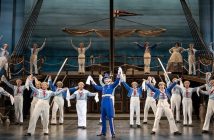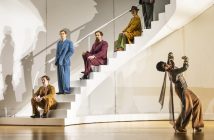Young soprano Elizabeth Llewellyn has had a difficult ride. After gaining a scholarship to study at the Royal Northern College of Music, she was struck by a mysterious illness which left her with no choice but to abandon her singing career and settle into a life of normality working in an office without reaching the height of professionalism that was her dream. But, after auditioning for amateur dramatic organisations near her home in south London, she was told that she should be aiming much higher.
So, after more training, she found Glyndebourne, the National Opera Studio and the English National Opera all jumping at the chance to take her on. Straight after finishing with the National Opera Studio, she went on to sing one of the greatest roles in the soprano repertory, Mimi in Puccini’s La Bohème, for the first revival of Jonathan Miller’s version of the iconic opera with the ENO.
“La Bohème was a great experience with a great team; I really enjoyed it,” says Elizabeth, possibly the most humble singer I have ever spoken to, when we meet a week before her appearance in the Rosenblatt Recitals at St John’s, Smith Square. She tells me about being in love with the idea that she is an “eternal student”; “I went straight into La Bohème after finishing at the Studio; Mimi was a role I had been studying.” We talk about the director Jonathan Miller: “He is magical and insightful,” she says, “and good at getting to the human heart.” Very true, I think; Miller’s Bohème has made me cry more than any other opera.
I ask her what it was like to study the role in Italian and then to sing it in English. Was the phrasing affected? “The libretto was tweaked during rehearsals to make it fit properly, and by performance number eight I wanted to break into Italian. The audience reaction to the English libretto is a much more immediate, which makes you as a singer more relaxed on stage.” Elizabeth sang the role of Mimi for the entire run of La Bohème to great critical acclaim.
Of the preparation for her recital in the Rosenblatt series, she tells me “it’s going really well; I’m on this journey of discovery with Simon (Lepper, the pianist accompanying her recital), which has been great, and we’ve formed a good relationship”. We discuss her varied programme for the recital. “I looked at other people’s programmes and they mainly stuck to one era or one theme or just used their best bits. My programme is basically edited highlights to date throughout my learning process and professional career.”
So, fast forward a week, when I take my seat for her performance at St John’s, Smith Square. I’ve only been to St John’s once before and commented then that it was certainly not my favourite recital hall in London. Elizabeth, gracious, walks on stage to much applause with Simon Lepper to sing Handel.
“Handel has always been a part of my vocal development,” she had told me. And you can tell; her carefully refined demonstrations of ‘Ma quando tornerai’ from Alcina and ‘Se’il mio duol’ from Rondelinda are exceptionally colourful, with vocal décor complementing both arias as well as evoking the era in which they were written. Perhaps you could say that the arias are sometimes too vocally heavy for some of the ornamentation she uses; her voice seems better suited to more romantic roles such as the works of Puccini. I’m surprised, though, by how Mozartian she is in ‘E Susanna non vien…Dove sono’ from Le Nozze di Figaro; she will make a most brilliant Contessa in Figaro at Opera Holland Park, coming in the summer season.
“The Walton cycle is a part of my musical scenery; south London has always been my home, so why not sing a song cycle all about London?” she had mused. William Walton’s song cycle, A Song for the Lord Mayor’s Table, was first performed in south London in 1962. The cycle contains texts by Blake, Jordan, Morris and Wordsworth and six songs for soprano and piano – beautifully offered now by Llewellyn and Lepper. While I’ve never been a big fan of Walton’s compositions, Elizabeth impresses with this lesser performed song cycle. Her colour choice for the piece is interesting, not what I had expected; I had hoped the tone would be somewhat brighter. She dances her way through ‘The Lord Mayor’s Table’, glides gently through to the ‘Rhyme’ where she recites ‘Oranges and Lemons’, the most delightful ditty to end the first half of her Rosenblatt debut.
After the interval, Elizabeth gets serious, with a programme of Strauss, Puccini, Verdi and Gounod. Her voice wears Strauss proudly and, like cashmere is soft on skin, Llewellyn’s voice is soft on our ears; it is most certainly the highlight of the recital. These are more than songs for her; they are Elizabeth’s life and soul projected to the audience. Notably her performances of ‘Standchen’ and ‘Du meines Herzens Kronelein’ as well as ‘Nachtgang’ are truly delicious. She had said to me that she “developed a real love for Strauss”, and I’m bloody glad she did.
She returns to perform some operatic arias, firstly reviving an Italian Mimi, giving us Mimi’s first aria in Act I of La Bohème, ‘Mi chiamano Mimi’.
“I would really love to sing Amelia in Simon Boccanegra,” she had said to me. And here, singing ‘Come in quest’ora bruna’, the UK’s most promising young opera talent has a chance to offer a snippet of what it would sound like if she was to play the full role. Glorious, her voice fits Verdi’s composition well, and I wouldn’t be surprised if she is lined up to play Amelia very soon.
Lastly an aria from Gounod’s Faust. Unfortunately it isn’t the best French I have ever heard, but wonderful singing nonetheless. Unfortunately, too, there isn’t a strong enough French ending; it needs more power and more fortissimo.
As she exits to rapturous applause, I recall what she told me a week ago. “This recital will be like looking through a photo album of my life.”
The Rosenblatt Recitals continue on 11 May at St John’s, Smith Square, with songs and arias by Righini, Spontini, Mozart, Vaccai, Bellini, Denza, Tosti and Rossini, sung by mezzo soprano Serena Malfi with pianist Michele Errico. Website.
Elizabeth Llewellyn will next sing the role of Contessa in Mozart’s Le Nozze di Figaro at Opera Holland Park.




